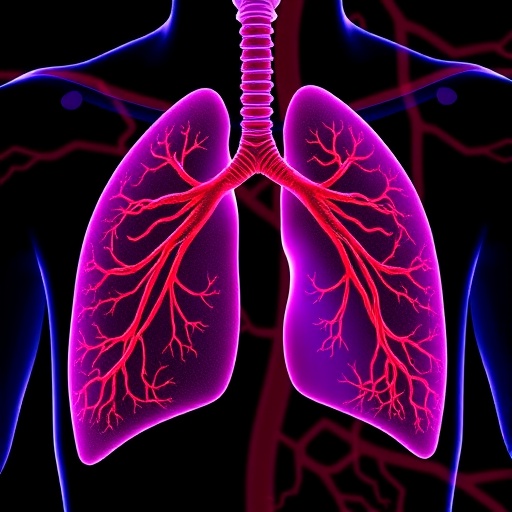In a groundbreaking development at the crossroads of oncology and cardiology, researchers have uncovered novel molecular mechanisms underpinning cardiac cachexia induced by lung adenocarcinoma. This intersection, often referred to as cardio-oncology, sheds light on the intricate biological dialogue between malignancy and cardiac deterioration—a field that has long been underexplored despite significant clinical ramifications. The latest findings, published by Fu, Lin, Chen and colleagues in Medical Oncology, delve deep into the pathways by which lung adenocarcinoma drives wasting syndrome in the heart, heralding new possibilities for diagnostic and therapeutic advances.
Cardiac cachexia represents a severe decline in heart muscle mass and function, observed in patients with advanced cancer, notably those afflicted by lung adenocarcinoma. Unlike conventional manifestations of heart disease, cardiac cachexia involves a multifaceted cascade of molecular alterations orchestrated by tumor-host interactions. The research team employed state-of-the-art transcriptomic and proteomic profiling techniques to map these alterations in affected cardiac tissue, revealing a distinct signature linked to tumor-derived factors.
At the molecular level, lung adenocarcinoma appears to trigger a systemic inflammatory response that profoundly impacts myocardial metabolism and structural integrity. Key mediators such as pro-inflammatory cytokines and tumor-derived exosomes were identified as pivotal agents inciting myocardial atrophy. These bioactive molecules disrupt calcium homeostasis, mitochondrial function, and redox balance within cardiomyocytes, ultimately compromising cardiac output and fostering progressive heart failure.
Intriguingly, the study revealed an unexpected upregulation of specific microRNAs (miRNAs) in the myocardium of cancer-bearing subjects. These miRNAs modulate gene expression networks responsible for muscle protein synthesis and degradation, effectively tipping the balance towards proteolysis and cellular apoptosis. The elucidation of these miRNA profiles not only enhances our understanding of cardiac cachexia but also presents potential biomarkers for early detection and personalized interventions.
In addition to these transcriptomic insights, proteomic analyses uncovered alterations in energy metabolism pathways within the failing heart. Enzymes critical for fatty acid oxidation and oxidative phosphorylation were markedly downregulated, hinting at a metabolic reprogramming that favors catabolism over energy production. This metabolic shift parallels observations in skeletal muscle wasting associated with cachexia, reinforcing the systemic nature of cancer-induced catabolic states.
The interplay between lung adenocarcinoma-derived factors and cardiac tissue extends beyond mere inflammatory signaling. The researchers highlighted aberrant activation of ubiquitin-proteasome and autophagy-lysosome pathways in cardiac cells, mechanisms traditionally associated with protein quality control. The excessive activation of these catabolic pathways instigates accelerated degradation of structural proteins, exacerbating myocardial wasting.
Furthermore, mitochondrial dysfunction emerged as a central feature of cardiac cachexia in this context. The team documented impaired mitochondrial biogenesis and increased production of reactive oxygen species (ROS) within cardiomyocytes. This oxidative stress not only damages mitochondrial DNA but also amplifies apoptotic signaling cascades, cumulatively undermining cardiac cellular viability.
These molecular revelations carry profound clinical implications. Current management of cancer patients rarely addresses cardiac cachexia explicitly, leading to overlooked deterioration of cardiac health that significantly influences morbidity and mortality. With the identification of specific molecular signatures, there is now potential to develop targeted therapeutics aimed at mitigating heart muscle loss without impeding oncologic treatment efficacy.
Translational strategies emerging from this research may involve pharmacologic modulation of miRNA activity, cytokine blockade, and mitochondrial protection to preserve cardiac function in lung adenocarcinoma patients. Additionally, advanced imaging coupled with molecular biomarkers could facilitate earlier diagnosis of cardiac cachexia, enabling timely intervention before clinical heart failure ensues.
This research also underscores the necessity of integrative cardio-oncology care models that monitor cardiac function as an integral component of cancer management. Interdisciplinary collaboration between oncologists and cardiologists will be vital for implementing these molecular insights into clinical practice, improving patient outcomes through comprehensive surveillance and tailored treatment paradigms.
Another critical facet illuminated by the study involves the role of tumor microenvironment-derived exosomes. These extracellular vesicles serve as vehicles for transferring oncogenic signals to distant organs, including the heart. By unravelling the cargo profiles of these exosomes, the research paves the way for novel liquid biopsy approaches to detect early signs of cardiac involvement in lung cancer.
Moreover, the study’s findings prompt reevaluation of adjuvant therapies currently employed in oncology, some of which may exacerbate cardiac cachexia. A delicate balance must be struck between preserving antitumor efficacy and preventing collateral cardiac damage, highlighting the importance of molecularly guided treatment regimens.
The recognition of lung adenocarcinoma as a systemic disease impacting cardiac muscle challenges the traditional compartmentalization of oncology and cardiology. It calls for expanded research focusing on the crosstalk mechanisms at the molecular level that precipitate multi-organ involvement in cancer. Such insights hold promise for revolutionizing both cancer care and cardiology by bridging gaps between disciplines.
Looking forward, larger cohort studies and clinical trials will be imperative to validate these molecular signatures and translate them into standardized diagnostic panels and therapeutic targets. The integration of multi-omics data sets encompassing genomics, proteomics, and metabolomics will enhance the resolution of cardiac cachexia’s molecular landscape, fostering precision medicine in cardio-oncology.
In conclusion, the pioneering work by Fu and colleagues marks a significant leap in understanding how lung adenocarcinoma orchestrates cardiac cachexia through intricate molecular signatures. It highlights an urgent need to address cardiac complications in the cancer continuum, emphasizing molecular diagnostics and targeted therapeutics as pathways to improved survival and quality of life for patients facing the dual burden of cancer and heart disease. This comprehensive molecular portrait opens new horizons for cardio-oncology, inviting innovation and collaboration to combat this devastating syndrome.
Subject of Research: Molecular mechanisms of lung adenocarcinoma-driven cardiac cachexia in the field of cardio-oncology
Article Title: Cardio-oncology in focus: novel molecular signatures of lung adenocarcinoma-driven cardiac cachexia
Article References:
Fu, Z., Lin, Z., Chen, S. et al. Cardio-oncology in focus: novel molecular signatures of lung adenocarcinoma-driven cardiac cachexia. Med Oncol 42, 406 (2025). https://doi.org/10.1007/s12032-025-02933-9
Image Credits: AI Generated




